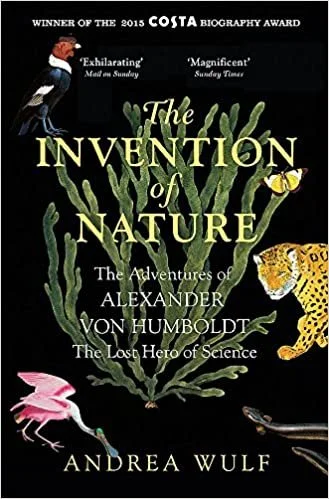ANDREA WULF
ADVENTURES OF ALEXANDER VON HUMBOLDT, THE LOST HERO OF SCIENCE (2015)
Winner of the 2016 Royal Society Science Book Prize.
Alexander von Humboldt (born 1769) was a pioneer in the field of botanical geography, and geomagnetic and meteorological monitoring. His scientific explorations of the Americas weere published over a period of twenty one years. He was one of the first to argue that South America and Africa were once joined as a single continent. He saw the world, and indeed the universe, as one interacting system and is for this reason regarded as the father both of ecology and environmentalism. Based on observations during his travels he made the case for human development causing climate change.
Humboldt’s travels in South America were adventurous as well as scientific. For example in 1800 he and his companion Bonpland encountered electric eels in a tributary of the Orinoco River. Their shock could be fatal to a man. Local people suggested driving wild horses into the river, which would bring the eels up out of the river mud. This they did, producing a wild struggle between eels and horses, some of which died. Humboldt and Bonpland managed to capture and dissect some eels, receiving potentially dangerous electiric shocks in the process. The experience caused Humboldt to think more deeply about magnetism and electricity.
Andrea Wulf gives a comprehensive account of Humboldt’s remarkable life in all its many aspects. The Economist described the book as ‘A superb biography’, the New Scientist as ‘Extraordinary and gripping’, and the Literary Review described it as ‘Dazzling’.
MEET THE AUTHOR
CLICK HERE FOR A VIDEO OF THE AUTHOR (15 MINUTES)
Andrea Wulf (born 1967) is a German-British writer specialising in the history of science. She was born in New Delhi, India, where her parents were working in development aid. She grew up in Hamburg, and studied at the University Luneburg, going on to study design history at the Royal College of Art in London. Her other books include ‘Chasing Venus: the Race to Measure the Heavens’ describing the scientific expeditions that set off around the world in 1761 and 1769 to collect data on the transit of Venus.

